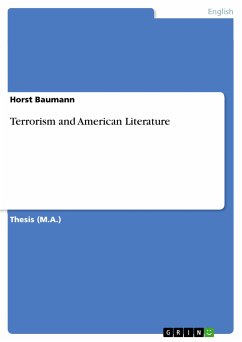Thesis (M.A.) from the year 2003 in the subject American Studies - Culture and Applied Geography, grade: 1,0, University of Cologne, language: English, abstract: In his essay "'God save us from the bourgeois adventure': The Figure of the Terrorist in Contemporary American Conspiracy Fiction" (1996), written in the aftermath of the 1993 attack on the World Trade Center, Steffen Hantke remarks how quickly politicians, the media, and the public at that time agreed that the bombing had to be understood as part of a larger confrontation between Western democracies and 'Islamic Fundamentalism' (for the following comp. 1996: 219-222). He goes on to argue that the then newly discovered enemy 'Islamic terrorism' had filled the vacancy in the collective political imagination that was left by the demise of Communism in the late 1980ies, and that this new conflict continued the kind of cultural paranoia that had sustained the historical narrative of the Cold War era. Hantke describes cultural paranoia as the effect of a cultural machinery that amalgamates complex political contexts and historical developments into homogeneous and larger-than-life cultural abstractions against which the collective political imagination can construct itself as a unified entity. In other words, cultural paranoia creates a sprawling narrative of the nation/the American way of life/Western civilization under threat that legitimizes state power, ensures compliance with dominant social norms and unifies the nation by stigmatizing dissent as treason.

